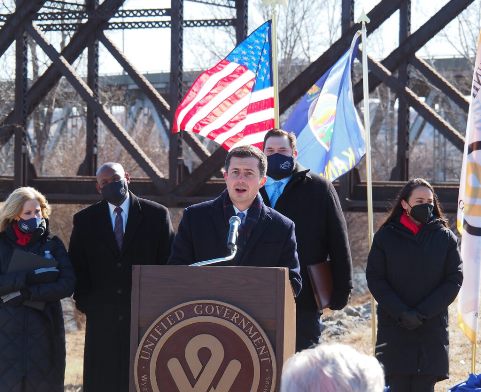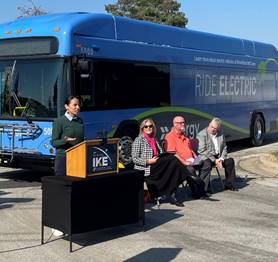
A plan for a bistate transit corridor was announced on Monday by U.S. Rep. Emanuel Cleaver, D-Missouri.
The proposed bistate corridor would travel from Independence, Missouri, to the Legends Outlets area of Kansas City, Kansas. It would be an electric bus route. Funding for the project would come from the $1.2 trillion federal infrastructure bill.
According to a news release from Rep. Cleaver’s website, the Bi-State Sustainable Reinvestment Corridor will provide investments to sustainability, mobility and economic development.
“President Biden’s Bipartisan Infrastructure Law is a once-in-a-generation opportunity for our entire region to create sustainable communities, provide greater opportunity for economic mobility, and ensure our jurisdictions have the energy efficient infrastructure necessary to remain competitive throughout the 21st century—but coordination is critical,” Rep. Cleaver said in the news release.
The news release announced support from area communities and officials, including Kansas City, Kansas, Mayor Tyrone Garner and U.S. Rep. Sharice Davids, D-3rd Dist.
“Part of the Kansas City Metro’s strength is our interconnection and collaboration. We should absolutely leverage that to bring smart, sustainable investments to our communities,” Rep. Davids stated in the news release. “Working together, we can use the historic bipartisan infrastructure law to make lasting improvements in our local economy, our climate impact, and our quality of life. I appreciate Congressman Cleaver’s leadership and look forward to working together with local and state partners in Kansas.”
“We look forward to catalyzing growth and opportunity within Kansas City, Kansas and Wyandotte County through the development of sustainable economic development strategies that are enabled by the Bi-State Sustainable Reinvestment Corridor and enhanced federal funding the corridor will bring to our community,” Mayor Garner said in the news release.
The bistate corridor would include State Avenue, Independence Avenue and Truman Road.
According to the news release, the bistate corridor would target federal funding to support:
• Zero-emission transportation options: Electric buses; new and upgraded mobility hubs; expanded KC Streetcar and MAX services; and pedestrian and bicycle infrastructure.
• Affordable housing: Energy-efficient retrofits; new units and construction; transit-oriented/connected development.
• Green infrastructure: Enhanced tree canopy coverage; upgraded stormwater systems; electric vehicle charging stations; residential solar panels.
• Broadband Access: Implementation of wired and wireless service; increased capacity; updated equipment.
• Safety and security enhancement: Shot spotter; license plate readers; Community Improvement Districts; other public safety technologies.
• Economic development: Workforce training; access to child care; private investment along the corridor.
• Public schools and libraries: Renewable energy and energy efficiency projects to reduce utility costs.
Grant to improve traffic flow at Legends not moved forward
In other recent news about The Legends Outlets and transportation, a grant application for improving traffic flow near The Legends did not move forward on Feb. 10.
At the Unified Government Commission’s Feb. 10 meeting, UG commissioners decided not to move forward with a grant application to the state of Kansas that would improve traffic flow and pedestrian access at the State Avenue and Village West Parkway area at The Legends Outlets. The project also would have redone an intersection, created opportunity for future growth at The Legends, and more access for those who are there for a game to walk to shopping areas while they are there.
The commission felt it did not have the $6.2 million required for the local match for the project. The $25 million project was through the Kansas Department of Transportation.
Economic reasons were cited for not moving the grant application forward.
The UG Commission did agree to move forward with two projects on the east side of Wyandotte County, an Armourdale project and the KC Riverfront project.
According to UG officials, there has already been enough funding invested in the Armourdale and KC Riverfront projects to provide the local match, without more being required from the UG.


